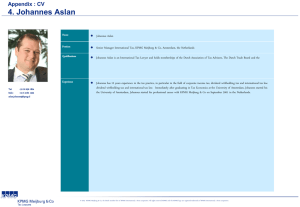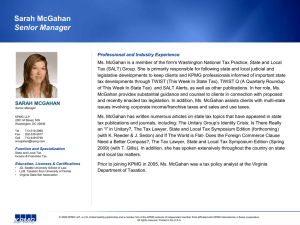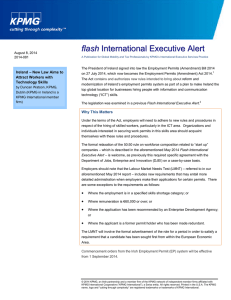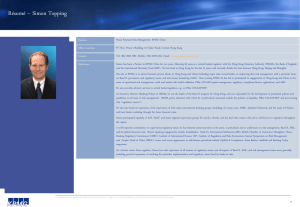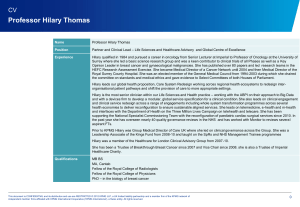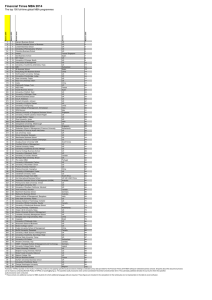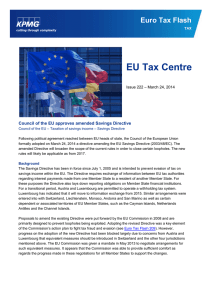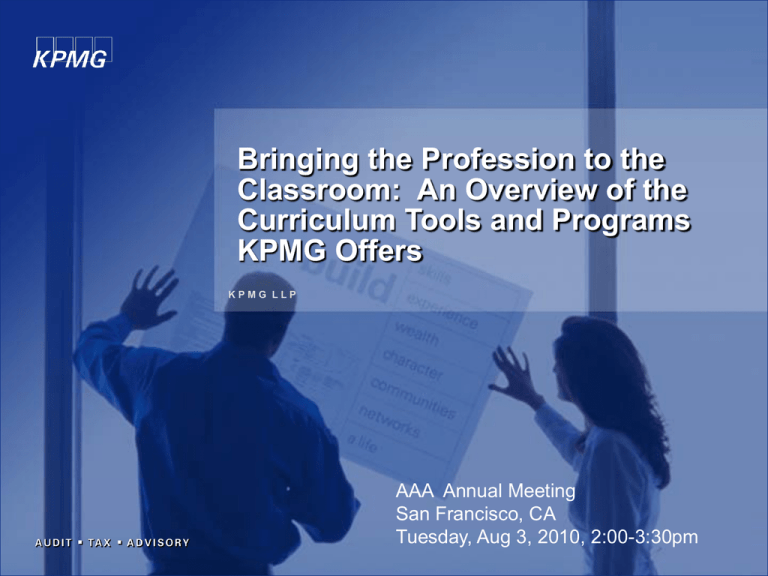
Bringing the Profession to the
Classroom: An Overview of the
Curriculum Tools and Programs
KPMG Offers
KPMG LLP
AAA Annual Meeting
San Francisco, CA
Tuesday, Aug 3, 2010, 2:00-3:30pm
Presenters
Dr. Steven D’Agustino
Bea Sanders
Director RETC: Center for National Director of Faculty
Professional Development
Relations
Dr. Barbara M Porco
Director of Program
Development
Accounting Faculty
Blane Ruschak
Executive Director of
University Relations and
Recruiting
Fordham University
KPMG, LLP
Overview of Presentation
The Ethical Compass: A Toolkit for Integrity in Business
KPMG Alumni Partners Teaching Initiative
The Professor Residency Program
Leveraging IFRS for Academe
The Accounting Doctoral Scholars Program
Additional Resources on the Faculty Portal: Curriculum Tools &
Programs Handout
3
The Ethical Compass
A Toolkit for
Integrity in
Business
©2010 KPMG LLP, a U.S. limited liability partnership and a member firm of the KPMG network of independent member firms affiliated with KPMG International, a Swiss
cooperative. All rights reserved. For Training Purposes Only.
©2010 Barbara Porco/Steven D’Agustino. Used with Permission. All rights reserved.
Ethical Compass Toolkits for the Classroom
Total of EIGHT Toolkits:
Video Dilemmas
Role Plays
Case Studies
Applied Ethics Cases
SOX Challenge
Code Challenge
Shades of Gray
Burden of Proof
(available 2011)
©2010 KPMG LLP, a U.S. limited liability partnership and a member firm of the KPMG network of independent member firms affiliated with KPMG International, a Swiss
cooperative. All rights reserved. For Training Purposes Only.
©2010 Barbara Porco/Steven D’Agustino. Used with Permission. All rights reserved.
Video Dilemmas
No lecture
KPMG Proprietary
Public Accounting Based
Sophomore/Junior/Senior
Success Dependent on
Instructor (“what if” scenarios)
Modular Structure
Concepts (i.e. Retaliation)
Can Be Adapted to Other
Business Majors
Classroom (Business), BAP
Launched in 2007
Role Plays
50/50 Lecture/Role Plays
Basic AICPA Code of Conduct
Public Accounting Based
Sophomore/Junior
Success Dependent on Size of
Class (small classes better); <75
Select Role Play students in
advance
Certain Role Plays Adaptable to
Other Business Majors
Classroom (Accounting), BAP
Launched in 2007
Case Studies
50/50 Lecture/Cases
Teaches general ethics decision
making model known as CARE2
Cases are Accounting Based
Freshmen; Sophomore; Junior;
or Seniors
Success dependent on
instructor (“what if” scenarios)
Concepts (i.e. Steroid Use)
Can be adapted to other majors
Classroom (Business), BAP,
Career Center Personnel
Launched in 2007
Applied Ethics Case Studies
50/50 Lecture/Cases
Teaches business ethics
decision making model known
as Applied CARE2
Cases are accounting based
Appropriate for any size class
Junior; Senior; or Masters
Classroom, BAP, Career
Center
Launched in 2008
Code of Conduct Challenge
75/25 Lecture/Game
Teaches Detailed Code of
Conduct
100% Accounting Based
Sophomore/Junior
Works Best if Taught by
Faculty
Classroom (Accounting),
BAP
Launched in 2008
Sarbanes Oxley Act Challenge
75/25 Lecture/Game
Teaches specific Sarbanes
Oxley Rules and Regulations
100% Accounting Based
Sophomore; Junior; Senior
Works best if taught by
faculty
Classroom – Accounting
classes or BAP
Launched in 2008
Description of the Shades of Gray
The Shades of Gray is a series of
ethical scenarios to be discussed
by students. Organized as a
group activity, the scenarios are
designed to help students
recognize ethical issues and
measure their ethical influence on
a group. The Shades of Gray
activity is accompanied by a
presentation that will discuss the
obstacles people face when
assessing the risks that
accompany decisions with ethical
dimensions.
12
Shades of Gray
Launched in 2009
Shades of Gray
Teaches ethical issues
Lecture/Game
and influence
Target audience
Juniors and seniors
Auditing Class
Delivery
Collaborative format: faculty and
practitioner
Classroom
©2010 KPMG LLP, a U.S. limited liability partnership and a member firm of the KPMG network of independent member firms affiliated with KPMG International, a Swiss
cooperative. All rights reserved. For Training Purposes Only.
©2010 Barbara Porco/Steven D’Agustino. Used with Permission. All rights reserved.
Shades of Gray
Game Card – Round One
Title of
Scenario
Your
Letter
Option
Family
Influence
Corporate
Discount
Firm
Policy
Professional
Practice
Friend
in Need
Workplace
Relationship
No. of
Others
Agree
(A)
Positive
Leader
Points
(B)
Total
Positive
Points
(A*B)= C
No. of
Others
Disagree
(D)
Negative
Leader
Points
(E)
100
(100)
100
(100)
100
(100)
100
(100)
100
(100)
100
(100)
Total
Negative
Points
(D*E)=F
Net
Influence
Score
(C+F)=G
Total
Points
©2010 KPMG LLP, a U.S. limited liability partnership and a member firm of the KPMG network of independent member firms affiliated with KPMG International, a Swiss
cooperative. All rights reserved. For Training Purposes Only.
©2010 Barbara Porco/Steven D’Agustino. Used with Permission. All rights reserved.
Workplace Relationship
©2010 KPMG LLP, a U.S. limited liability partnership and a member firm of the KPMG network of independent member firms affiliated with KPMG International, a Swiss
cooperative. All rights reserved. For Training Purposes Only.
©2010 Barbara Porco/Steven D’Agustino. Used with Permission. All rights reserved.
Workplace Relationship
Brett, a manager, is having a romantic relationship
with Corey, a director in a different department. As a
result of possessing unique knowledge and
experience, Brett has been selected to serve as the
auditor manager of a multi-disciplinary engagement
with a major client. This engagement presents a
significant opportunity for career advancement. Brett
has just learned that Corey is assigned to the team on
this engagement.
What should Brett do?
©2010 KPMG LLP, a U.S. limited liability partnership and a member firm of the KPMG network of independent member firms affiliated with KPMG International, a Swiss
cooperative. All rights reserved. For Training Purposes Only.
©2010 Barbara Porco/Steven D’Agustino. Used with Permission. All rights reserved.
Options for Brett
A. Inform the performance manager of the relationship
with Corey
B. Say nothing about the relationship
C. Recommend that someone (instead of Brett) else be
assigned to this engagement without disclosure
D. Ask Corey to decline to participate on the
engagement
E. End the relationship with Corey and accept the
assignment
©2010 KPMG LLP, a U.S. limited liability partnership and a member firm of the KPMG network of independent member firms affiliated with KPMG International, a Swiss
cooperative. All rights reserved. For Training Purposes Only.
©2010 Barbara Porco/Steven D’Agustino. Used with Permission. All rights reserved.
Shades of Gray
Game Card Round One – Measures Influence
Title of
Scenario
Taking the
Test
Friend in
Need
The Job
Offer
Charging
Time
Social
Responsibility
Workplace
Environment
Your
Letter
Option
E
No. of
Team
Agreed
(A)
1
Positive
Leader
Points
(B)
Total
Positive
Points
(A*B)= C
No. of
Team
Disagreed
(D)
Negative
Leader
Points
(E)
100
-100
100
-100
100
-100
100
-100
100
-100
100
0
10
-100
Total
Negative
Points
(D*E)=F
Net
Influence
Score
(C+F)=G
-1,000 -1,000
©2009 KPMG LLP, a U.S. limited liability partnership and a member firm of the KPMG network of independent member firms affiliated with
KPMG International, a Swiss cooperative. All rights reserved. For Training Purposes Only.
©2009 Barbara Porco and Steven D’Agustino. Used with Permission. All rights reserved.
Plot this
score!
18
Assessing Risk
How confident are
you in your ability
to assess risk?
When is it wise to
be cautious?
©2010 KPMG LLP, a U.S. limited liability partnership and a member firm of the KPMG network of independent member firms affiliated with
KPMG International, a Swiss cooperative. All rights reserved. For Training Purposes Only.
©2010 Barbara Porco and Steven D’Agustino. Used with Permission. All rights reserved.
19
Risk Perception
Chauncey Starr
found that people
will accept risks
1,000 greater if they
are voluntary
(driving a car)
than if they are
involuntary
(a nuclear disaster).
©2010 KPMG LLP, a U.S. limited liability partnership and a member firm of the KPMG network of independent member firms affiliated with
KPMG International, a Swiss cooperative. All rights reserved. For Training Purposes Only.
©2010 Barbara Porco and Steven D’Agustino. Used with Permission. All rights reserved.
20
The Limits of Knowledge
“There are known knowns.
There are things we know that
we know. There are known
unknowns. That is to say, there
are things that we now know
we don’t know. But there are
also unknown unknowns. There
are things we do not know we
don’t know.”
Donald Rumsfeld
Former Secretary of Defense
©2010 KPMG LLP, a U.S. limited liability partnership and a member firm of the KPMG network of independent member firms affiliated with
KPMG International, a Swiss cooperative. All rights reserved. For Training Purposes Only.
©2010 Barbara Porco and Steven D’Agustino. Used with Permission. All rights reserved.
21
Social Proof
Herd Mentality
A psychological
phenomenon that occurs
when people are unable
to determine the
appropriate mode of
behavior.
One assumes that others
know more about the
situation and know better
what to do.
©2009 KPMG LLP, a U.S. limited liability partnership and a member firm of the KPMG network of independent member firms affiliated with
KPMG International, a Swiss cooperative. All rights reserved. For Training Purposes Only.
©2009 Barbara Porco and Steven D’Agustino. Used with Permission. All rights reserved.
22
Scoring Rationale Table
Workplace Relationship
O
p
t
i
o
n
Individual Impact
+
=
Net
Impact
FI
CI
PI
Net
CI
+100 +100
+200
+200
+200
+600
+700
-100
-100
-100
-200
-200
-200
-600
-700
+100
-100
0
0
0
-200
0
-200
-200
D
+100
+100
-100
-100
0
0
0
0
-100
E
-100
-100
-100
-300
-200
-200
-200
-600
-900
PI
CI
A
-100
+100
B
+100
C
RI
Net
II
Collective Impact
©2010 KPMG LLP, a U.S. limited liability partnership and a member firm of the KPMG network of independent member firms affiliated with KPMG International, a Swiss
cooperative. All rights reserved. For Training Purposes Only.
©2010 Barbara Porco/Steven D’Agustino. Used with Permission. All rights reserved.
Shades of Gray
Game Card Round Two: Measures Ethics
Title of Scenario
Your
Letter
Option
Net Impact
Points from
Tables
Cumulative
Ethical Option
Net Score
E
-900
-900
Taking the Test
Friend in Need
The Job Offer
Charging Time
Social Responsibility
Workplace Environment
©2010 KPMG LLP, a U.S. limited liability partnership and a member firm of the KPMG network of independent member firms affiliated with
KPMG International, a Swiss cooperative. All rights reserved. For Training Purposes Only.
©2010 Barbara Porco and Steven D’Agustino. Used with Permission. All rights reserved.
24
Interpretation of Game Scores
Positive
Ethics
Negative
High Ethics
Low Influence
High Ethics
High Influence
Low Ethics
Low Influence
Low Ethics
High Influence
Negative
Positive
Influence
©2010 KPMG LLP, a U.S. limited liability partnership and a member firm of the KPMG network of independent member firms affiliated with KPMG International, a Swiss
cooperative. All rights reserved. For Training Purposes Only.
©2010 Barbara Porco/Steven D’Agustino. Used with Permission. All rights reserved.
Interpretation of Game Scores
Positive
Ethics
Negative
High Ethics
Low Influence
High Ethics
High Influence
Low Ethics
Low Influence
Low Ethics
High Influence
Negative
Positive
Influence
©2010 KPMG LLP, a U.S. limited liability partnership and a member firm of the KPMG network of independent member firms affiliated with KPMG International, a Swiss
cooperative. All rights reserved. For Training Purposes Only.
©2010 Barbara Porco/Steven D’Agustino. Used with Permission. All rights reserved.
Conclusion: Proceed in which direction?
The number of variables,
possible consequences and
overlooked or
misunderstood facts, makes
accurate risk assessment
close to impossible.
The ability to predict the
impacts of decisions is elusive
and often wildly overestimated.
In the absence of complex
mathematical models, an
individual is left with only
instinct and an often vague
sense of how to proceed.
©2010 KPMG LLP, a U.S. limited liability partnership and a member firm of the KPMG network of independent member firms affiliated with KPMG International, a Swiss
cooperative. All rights reserved. For Training Purposes Only.
©2010 Barbara Porco and Steven D’Agustino. Used with Permission. All rights reserved.
27
Shades of Gray
Ethical Decisions
Doing the “right thing”
is the only effective and
reliable method of
minimizing risk.
Consider both individual
and collective impact of
your decisions
Ethical decisions allow
one to be confident of
the outcome!
Burden of Proof
Students will be
presented with a series
of “suspects” and be
asked to conduct an
investigation to
determine who most
likely committed an act
of fraud.
Burden of Proof
Available 2011
Burden of Proof
Teaches professional
skepticism
Lecture/Game
Target audience
All levels
Accounting Class
Delivery
Collaborative format: faculty and
practitioner
Classroom
©2010 KPMG LLP, a U.S. limited liability partnership and a member firm of the KPMG network of independent member firms affiliated with KPMG International, a Swiss
cooperative. All rights reserved. For Training Purposes Only.
©2010 Barbara Porco/Steven D’Agustino. Used with Permission. All rights reserved.
Some Examples of Deployment
Beta Alpha Psi (BAP) – Regional Meetings
Penn State – BAP events
Penn State – Accounting Classes
Notre Dame – BAP events
OSU – Career Center
NACE – Career Center
EFWA – Annual Conference
BYU – Junior Core Program
Fordham University – Freshman Enrichment Program
Fordham University – Accounting Ethics classes
©2010 KPMG LLP, a U.S. limited liability partnership and a member firm of the KPMG network of independent member firms affiliated with KPMG International, a Swiss
cooperative. All rights reserved. For Training Purposes Only.
©2010 Barbara Porco/Steven D’Agustino. Used with Permission. All rights reserved.
Recommendations for Success
Flexibility
Mix and Match
Interactive Emphasis
Real Examples
Challenge Thinking via “What If’s”
©2010 KPMG LLP, a U.S. limited liability partnership and a member firm of the KPMG network of independent member firms affiliated with KPMG International, a Swiss
cooperative. All rights reserved. For Training Purposes Only.
©2010 Barbara Porco/Steven D’Agustino. Used with Permission. All rights reserved.
KPMG ALUMNI PARTNERS
TEACHING INITIATIVE
33
KPMG Alumni Partners Teaching Initiative
Discussed concept with Educators Advisory Board
Interest/need for PQ faculty
Key elements to consider
Developed educational webcast for interested alumni
Awareness/expectations of university environment
Invaluable assistance from educators-Kevin Stocks,
Catherine Burns, Susan Crosson, Scott Showalter
Created a task force of educators for feedback
Content of Instructor Profile
Facilitate access for program administrators
Faculty Portal site and search tool
34
Faculty Portal – Alumni Instructor Profiles
35
Faculty Portal – Alumni Instructor Profiles
36
Faculty Portal – Alumni Instructor Profiles
37
Faculty Portal – Alumni Instructor Profiles
38
Faculty Portal – Alumni Instructor Profiles
39
Faculty Portal – Alumni Instructor Profiles
40
Faculty Portal – Alumni Instructor Profiles
41
Faculty Portal – Alumni Instructor Profiles
42
KPMG Professor Residency Program
Launched four years ago – residencies in Tax, Audit
and Advisory Services
Total of 19 faculty to date
Period of residency from 3 to 5 months; some longer
A paid residency that is available at KPMG offices
across the country
Applications are accepted for current and future years
Key contact: Malana White at mmwhite@kpmg.com
43
Leveraging IFRS for Academe
Two-day IFRS Seminars for Faculty cosponsored with schools
Two seminars held this spring: University of
Connecticut and San Diego State University
Slide presentation with instructor notes and 10 cases
are posted on the Faculty Portal
Series of monthly IFRS webcasts
Recently launched a series of monthly webcasts
thru Jan, 2011
More than forty webcasts available for replay on
Faculty Portal
44
Leveraging IFRS for Academe (cont’d)
IFRS e-Learning Modules for Classroom
Two pilots held in the Fall with 3 modules
Preparing to launch a case competition for case studies
to support modules in the classroom
AAA/KPMG Faculty Survey
Collaboration with AAA to gauge IFRS in the curriculum
Third survey underway – takes 10 minutes
45
Accounting Doctoral Scholars Program
First year of ADS program very successful
27 scholars enrolled in doctoral programs Fall 2009;
10 of the scholars are from KPMG
5 additional doctoral candidates (not ADS scholars) also
enrolled in doctoral programs
Year 2 of the program repeats success
39 participating universities for 2010 enrollments
29 scholars will enroll in doctoral programs next Fall
11 of the scholars are from KPMG
Year 3 applications accepted from July 1 thru Oct 1
38 participating universities for 2011 enrollments
46
CURRICULUM TOOLS AND
PROGRAMS HANDOUT
47
Questions?
©2010 KPMG LLP, a U.S. limited liability partnership and a member firm of the KPMG network of independent member firms affiliated with KPMG International, a Swiss
cooperative. All rights reserved. For Training Purposes Only.
©2010 Barbara Porco/Steven D’Agustino. Used with Permission. All rights reserved.
48


